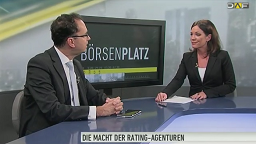DEVK mit vorbildlicher Ratinghistorie
Von Dr. Oliver Everling | 10.Februar 2009
Der Deutsche Eisenbahn Versicherung Sach- und HUK-Versicherungsverein a.G. (DEVK VVaG) und die DEVK Allgemeine Versicherungs-Aktiengesellschaft (DEVK AG) feiern zehnjähriges Jubiläum im Assekurata-Ratingprozess und durchgängig lautet das Gesamturteil aus Kundensicht „exzellent“.
Beide Schaden-/Unfallversicherer der DEVK (DEVK) weisen eine weit überdurchschnittliche Sicherheitsmittelausstattung aus. Durch den kontinuierlichen Eigenkapitalaufbau verfügt der DEVK VVaG mittlerweile über eine Eigenkapitalquote von 307,73 %. Andere Versicherungsunternehmen mit der gleichen Rechtsform erreichen hier durchschnittlich 67,88 %. Unterstrichen wird die exzellente Unternehmenssicherheit durch das hervorragende Risikomanagement der Gesellschaft. Dieses zeichnet sich unter anderem durch eine vorsichtige Annahmepolitik und einen gezielten Rückversicherungsschutz aus. Letzterer sichert die DEVK insbesondere gegen Spitzenrisiken ab, wie sie beispielsweise aus dem Orkan „Kyrill“ Anfang des Jahres 2007 resultierten.
In der Teilqualität Erfolg erzielt die DEVK ebenfalls ein exzellentes Urteil. Dieses kommt beispielsweise in der versicherungstechnischen Ergebnisquote feR zum Ausdruck. Während der Markt hier in 2007 einen Wert von 3,64 % erreicht, ist dieser bei der DEVK AG mit 7,31 % mehr als doppelt so hoch ausgeprägt. Der Grundstein für dieses hervorragende Ergebnis liegt in der vorsichtigen Kalkulation und Sicherheitspolitik der DEVK, die dem Unternehmen auch für die Zukunft positive Erfolgspotenziale in der Versicherungstechnik gewähren. Auch die Kapitalanlage trägt einen wesentlichen Teil zu der exzellenten Erfolgslage bei. Mit ihrem vorausschauenden Kapitalanlageinvestment und entsprechenden Absicherungsmaßnahmen ist die DEVK gegen Risiken, wie zum Beispiel aus der aktuellen Finanzkrise, bestens gewappnet. Ihr umfassendes Kapitalanlagemanagement sichert der Gesellschaft auch zukünftig hohe Erträge.
Nach Ansicht von Assekurata ist die Kundenorientierung der DEVK als exzellent zu bewerten. Im Rahmen des Folgeratings wurde für beide Unternehmen in 2008 eine Kundenbefragung durchgeführt. Wie in den Jahren zuvor erreicht die DEVK exzellente Befragungsergebnisse. Hier zeigt sich zum einen eine starke und überdurchschnittliche Kundenbindung. So geben beispielsweise 93,5 % der DEVK VVaG-Kunden an, den DEVK VVaG zukünftig weiterzuempfehlen. Der Durchschnitt der von Assekurata gerateten Schaden-/Unfallversicherungsunternehmen erzielt hierbei einen Wert von 81,9 %. Zum anderen zeigen die Befragungsergebnisse eine hohe Kundenzufriedenheit mit der DEVK. Ein wesentlicher Einflussfaktor auf die Gesamtzufriedenheit ist der Service der beiden Gesellschaften. Besonders die Unterstützung durch die Vermittler sehen die Kunden dabei als überaus wichtig an. Um noch näher beim Kunden zu sein und die Kundenbetreuung weiter zu intensivieren, hat die DEVK ihr Agentursystem neu organisiert und somit ihren Vertrieb weiter gestärkt. Darüber hinaus ergreift die DEVK eine Vielzahl von sowohl technischen als auch organisatorischen Maßnahmen, um die Dauer der Antrags- sowie der Schadenbearbeitung weiter zu verkürzen.
Bei der gegenwärtigen Wettbewerbssituation in der Kraftfahrtversicherung setzt die DEVK auf ihr Image als Niedrigpreisversicherer mit einer gleichzeitig hohen Servicequalität. Nach einer Tarifabsenkung ist die aktuelle Wachstumsentwicklung ein Beleg für das hervorragende Preis-Leistungsverhältnis des Unternehmens in der Kraftfahrtversicherung. Auch in den anderen Versicherungssparten erhöht die DEVK durch stetige Leistungserweiterungen und der Zunahme der Assistance-Leistungen ihre
Attraktivität. Darüber hinaus ergeben sich zusätzliche Wachstumschancen für die DEVK aus der Kooperation mit den Sparda-Banken. Insgesamt sind nach Auffassung von Assekurata das Wachstum und die Attraktivität der DEVK als sehr gut zu beurteilen.
Themen: Versicherungsrating | Kommentare deaktiviert für DEVK mit vorbildlicher Ratinghistorie
Günstiger und besser direkt versichert
Von Dr. Oliver Everling | 9.Februar 2009
Die Cosmos Lebensversicherungs-AG erreicht im Rating von Assekurata zum vierten Mal in Folge eine aus Kundensicht exzellente Beurteilung der Unternehmensqualität. Deutschlands größter Direktversicherer erhält in vier von fünf Teilqualitäten die Bestnote. Wer glaubt, dem Versicherungsmakler auf dem Dorf mehr vertrauen zu können als den Direktversicherungsangeboten über das Internet, wird durch die von Assekurata recherchierten Fakten nicht bestätigt.
Assekurata schätzt die Unternehmenssicherheit des Direktversicherers unverändert als exzellent ein. Der Schwerpunkt der Geschäftstätigkeit liegt im Bereich der Risikoversicherungen. Der Bestandsanteil der kapitalbildenden Lebensversicherungen beträgt gemessen an den Versicherungssummen lediglich 12 %, während auf die Risikoversicherungen rund 88 % entfallen. Unter Sicherheits- und Erfolgsgesichtspunkten haben daher Kapitalanlagerisiken gegenüber den versicherungstechnischen Risiken einen geringeren Stellenwert. Die versicherungstechnische Kalkulation erfolgt nach Ansicht von Assekurata auf der Basis hoher Kompetenz und auskömmlicher Sicherheitsmargen. Die Sicherheitsmittelquote lag gemessen am Kundenguthaben im Geschäftsjahr 2007 mit 13,09 % deutlich über dem Marktdurchschnitt von 9,69 %.Vor dem Hintergrund des Geschäftsmix ist die Ausstattung mit Sicherheitsmitteln aus Sicht von Assekurata angemessen dotiert, und sie wird dem stark wachsenden Geschäft kontinuierlich angepasst. Die Organisation und die Instrumente des Risikomanagements insgesamt haben aus Sicht von Assekurata einen hohen Standard. Positiv wirkt sich hier auch die Einbindung in den Generali Deutschland Konzern aus.
Die ebenfalls exzellente Erfolgssituation wird maßgeblich durch stabile und hohe versicherungstechnische Erträge bestimmt. Im Geschäftsjahr 2007 erreicht das Unternehmen zudem eine Nettoverzinsung von 4,99 % und kann sich damit positiv vom Markt (4,66 %) absetzen. Von den Auswirkungen der Finanzmarktkrise ist die CosmosDirekt Leben primär auf der Aktienseite betroffen. Durch den Bestandsschwerpunkt in der Risikoversicherung wird eine rückläufige Kapitalanlagerendite im Geschäftsjahr 2008 die Erfolgssituation des Unternehmens aber nur in geringem Maße beeinflussen, schreiben die Analysten der Ratingagentur. Positiv hebt Assekurata die günstigen Kostenstrukturen des Unternehmens. Die Verwaltungs- und Abschlusskostenquoten liegen 2007 mit 1,38 % bzw. 2,58 % deutlich unter den Marktdurchschnittswerten von 2,95 % und 5,12 %.
Assekurata beurteilt die Gewinnbeteiligung der CosmosDirekt Leben mit exzellent. Mehr als 96 % des erwirtschafteten Unternehmenserfolgs schüttet der Direktversicherer in 2007 an die Versicherten aus. Für 2009 gewährt das Unternehmen mit 4,25 % eine marktgängige laufende Verzinsung. Diese führt über die zeitnahe Gewinnausschüttungspolitik mit hohen Garantiewerten zu überdurchschnittlichen Beitragsrenditen. Auch die in der Vergangenheit erzielten Beitragsrenditen liegen auf einem überdurchschnittlichen Niveau. Stabilisierend auf die Überschussbeteiligung wirken sich hohe und kontinuierlich steigende Risiko- und Kostenerträge aus.
Die Kundenorientierung der CosmosDirekt Leben erzielt insgesamt eine sehr gute Bewertung. Teil des Ratingprozesses ist eine repräsentative empirische Kundenbefragung. Hier zeigt sich ein überdurchschnittlich hohes Zufriedenheitsniveau der Kunden mit dem Direktversicherer. Zudem zeichnet sich die Gesellschaft durch eine exzellente Weiterempfehlungs- und Wiederabschlussbereitschaft aus. So würden 82,8 % der Befragten die CosmosDirekt Leben ganz bestimmt oder wahrscheinlich weiterempfehlen. Der Durchschnitt der von Assekurata gerateten Lebensversicherer erreicht hier nur einen Wert von 71 %. Mit 93,7 % zeigen sich auch überdurchschnittlich viele Befragte bereit, ihre Versicherung wieder bei der CosmosDirekt Leben abzuschließen (Assekurata-Durchschnitt: 82,3 %). Der Direktversicherer zeichnet sich aus Sicht von Assekurata durch eine sehr gute Servicequalität aus. Hierzu trägt insbesondere die sehr gute telefonische Erreichbarkeit sowie die ausgeprägte Hilfsbereitschaft der Mitarbeiter bei. Dies bestätigen auch die Kunden. So gaben 78,2 % der Befragten an, mit der telefonischen Erreichbarkeit der Mitarbeiter sehr oder vollkommen zufrieden zu sein. Die Benchmark der gerateten Versicherer liegt diesbezüglich bei 52,2 %. In Puncto Hilfsbereitschaft zeigen sich 74,3 % der Kunden sehr oder vollkommen zufrieden mit dem Direktversicherer. Der entsprechende Durchschnittswert der Vergleichsgrupe liegt bei 53,2 %.
Das Wachstum und die Attraktivität des Versicherers am Markt wird von Assekurata exzellent beurteilt. Mit einem Beitragswachstum von 6,28 % im Geschäftsjahr 2007 ist die Wachstumsdynamik der CosmosDirekt Leben weitaus höher als im Marktdurchschnitt (0,42 %). Flankiert wird das hohe Wachstum durch eine sehr geringe Stornoquote von 2,8 % (Marktdurchschnitt: 4,99 %). Die Produkte des Direktversicherers nehmen in Preis-/Leistungsvergleichen immer wieder Spitzenpositionen ein und verfügen daher über eine hohe Attraktivität und bieten weitere Wachstumspotenziale. Wachstumstreiber ist weiterhin die Risikoversicherung. Hier ist die CosmosDirekt Leben Marktführer. Zudem kann sich das Unternehmen im Rahmen des Alterseinkünftegesetzes mit wettbewerbsfähigen Produkten zur Riester- und Basisrente profilieren.
Themen: Versicherungsrating | Kommentare deaktiviert für Günstiger und besser direkt versichert
Immobilienratings auf der CIMMIT
Von Dr. Oliver Everling | 9.Februar 2009
Die Zahl der Haushalte in Deutschland wird bis 2020 kontinuierlich zunehmen und erst nach 2030 rückläufig sein, legte Dr. Marc Weinstock, Vorstandsvorsitzender von HSH Real Estate auf der 19. Jahresauftaktveranstaltung der Immobilienwirtschaft dar (www.cimmit.de). Mit Wohnimmobilien Geld zu verdienen, sei bis dahin Weinstock zufolge „nicht schwer“, solange die Demografie- und Migrationsentwicklungen berücksichtigt würden. Drescher stellte nachfragerorientierte Wohnungstypen vor und sprach sich für zielgerichtete Immobilienangebote nach Wohntrends aus. Dass Wohnimmobilien in Deutschland interessant seien und in diesem Segment Nachfrage bestehe, bestätigte Dr. Sven Helmer, Geschäftsführer von Lazard & Co. Weinstock empfahl, die Immobilienvermarktung außerhalb von A-Standorten flexibel auf die Nutzer-Zielgruppen auszurichten. Klaus Elmendorff, Managing Director bei der Deutschen Bank, bezeichnete Wohnimmobilien als vergleichsweise krisensicher. Bärbel Schomberg, Vorsitzende der Degi-Geschäftsführung, berichtete, dass verstärkt Spezialfonds von Versicherungen im Wohnimmobilienbereich nachfragten. Die Immobilie werde als Vermögensgegenstand wiederentdeckt, die Zeit finanzmarktgetriebener Transaktionen sei vorbei. Elmendorff postulierte: „Wir brauchen ein besseres Verständnis dafür, wo Werte sind.“
Weil die Immobilienbranche immer stark fremdfinanziert sei, seien Partnerschaften erforderlich, gerade in der Entwicklung, erklärte Ulrich Höller, Vorstandsvorsitzender der DIC Deutsche Immobilien Chancen. Klaus Laminet, Geschäftsführender Gesellschafter von Investa, stimmte zu: „Man braucht institutionelle Anleger, die das Risiko der Projektentwicklung mittragen.“ Höller plädierte für eine antizyklische Projektentwicklung. Ein Entwicklungszyklus dauere zwischen drei und fünf Jahren, und bisher seien Entwicklungen so spät begonnen worden, dass ihr Abschluss oft schon in die nächste Abschwungphase gefallen sei. Laminet präzisierte angesichts der Krise: „Die Projekte, die heute in der Pipeline sind, werden nur zu einem Bruchteil gebaut.“ Aktuell biete sich die „Chance und Herausforderung“, Projekte in den nächsten Aufschwung zu entwickeln, so Höllers Einschätzung. Philipp Schmitz-Morkramer, Vorstand von Quantum Immobilien, sprach den Trend zur Nachhaltigkeit an, gab jedoch zu bedenken: „Die Mieter sind heute nicht bereit, das Add-on Green Building zu bezahlen.“ Götz U. Hufenbach, Vorstandsmitglied von Wayss & Freytag, resümierte, dass aus unterschiedlicher Substanz unterschiedliche Wertschöpfung zu heben sei.
Die Erwartungen institutioneller Investoren präsentierte Dr. Helmut Knepel, Chief Executice Officer von Feri EuroRating Services, anhand einer repräsentativen Studie. Dafür wurden 150 Vertreter von Altersversorgern, Banken, Versicherungen und anderen institutionellen Investoren befragt, deren Gesamtanlagevolumen sich auf rund eine Billion Euro belief. Die Immobilienquote dieses Volumens soll der Studie zufolge von sieben Prozent im Jahr 2008 auf 7,5 Prozent im Jahr 2011 gesteigert werden. Das entspreche einem Vermögen von 18 Milliarden Euro. Hauptgrund: „Immobilien liefern starke Cash-flows mit relativ geringen Wertschwankungen“, so Knepel. Die Nachfrage konzentriere sich zu rund 80 Prozent auf Core- und Core-plus-Immobilien. Institutionelle Investoren gingen von direkten zu indirekten Anlagen über und investierten vermehrt in Spezialfonds. Knepel: „Der Spezialfondsanteil ist in den vergangenen zehn Jahren bis 2008 um durchschnittlich 23 Prozent jährlich angestiegen.“
Von der Abgeltungssteuer sind institutionelle Investoren nicht betroffen. Dr. Matthias Stürmer, Geschäftsführender Gesellschafter von Pacific Star Europe, machte darauf aufmerksam, dass die Steuer nur für Privatanleger gelte. Aus Anbietersicht gab Walter Klug von Morgan Stanley Real Estate Investment den Leitsatz aus: „Der offene Fonds ist der Gewinner der Abgeltungssteuer.“ Für ihn sei der Immobilien-Dachfonds ein Megatrend im privaten Bereich. Prof. Karl-Georg Loritz, Ordinarius an der Universität Bayreuth, mahnte, Dachfonds genau darauf zu prüfen, wo investiert werde und woher die Rendite komme. Außerdem müssten die Risiken und der Exit bekannt sein: „Ein Dachfonds darf kein Gurkensammler werden, wo jede faule Gurke, die sich nicht verkaufen lässt, hineinkommt.“ Loritz forderte mehr Transparenz an den Kapitalmärkten, was auch für offene Immobilienfonds gelte.
Der 20. IIR Jahresauftaktkongress der Immobilienwirtschaft „CIMMIT“ findet am 26. und 27. Januar 2010 in Frankfurt statt (www.cimmit.de).
Themen: Immobilienrating | Kommentare deaktiviert für Immobilienratings auf der CIMMIT
Coface Forderungsspezialist in Niederlanden
Von Dr. Oliver Everling | 5.Februar 2009
Coface weitet das Geschäft in den Niederlanden aus. Dort hat Coface Deutschland jetzt einen Anbieter von Services im Debitorenmanagement gekauft: Trust Krediet Beheer (TKB). TKB mit Sitz in Amsterdam bietet neben dem Forderungseinzug über die Beteiligungsgesellschaften auch die Übernahme des Debitorenmanagements und das so genannte Secondment (zeitweise Überlassung oder Vermittlung von Kreditmanagern in Kundenunternehmen) sowie passende IT-Lösungen an. TKB gehört zu den führenden Anbietern im Debitorenmanagement in den Niederlanden und beschäftigt insgesamt 95 Mitarbeiter. Zuletzt wurde ein Umsatz in Höhe von rund 8,5 Millionen Euro erzielt. Tom Pasterkamp, Gründer und bisheriger Inhaber von TKB, ist weiterhin Geschäftsführer.
Mit dem Kauf will Coface Deutschland, in der Coface unter anderem für den niederländischen Markt zuständig, die Marktposition und Geschäftsaussichten von Coface Nederland weiter verbessern. Das Debitorenmanagement mit Inkasso ist im Nachbarland neben Kreditversicherung, Factoring und Bonitätsinformationen das vierte Geschäftsfeld, das nun deutlich verstärkt wird. „Einführung oder Ausbau der vier Business Lines ist erklärte Strategie der Coface weltweit“, sagte Benoît Claire, Vorstandvorsitzender von Coface Deutschland. „Mit der Integration des renommierten Unternehmens können wir unseren Kunden in den Niederlanden für das inländische Geschäft, aber zum Beispiel auch deutschen Unternehmen mit Geschäftsbeziehungen nach Holland erweiterte Angebote machen und den Service weiter verbessern.“
Benoît Claire sieht für den Inkassomarkt, wie auch für das Factoringgeschäft, das Coface vor kurzem in den Niederlanden eingeführt hat, gute Perspektiven. Zwar sei der Inkassomarkt stark zersplittert und hart umkämpft. „Wir sind aber der Anbieter, der mit vier Business Lines im Forderungsmanagement komplementäre oder integrierte Lösungen für Unternehmen aller Größen anbieten kann.“
Themen: Unternehmensrating | Kommentare deaktiviert für Coface Forderungsspezialist in Niederlanden
Anlagetrends institutioneller Investoren
Von Dr. Oliver Everling | 3.Februar 2009
Auf dem 19. IIR Jahresauftaktkongress der Immobilienwirtschaft, der CIMMIT 2009 (www.cimmit.de), stellte Dr. Helmut Knepel von der Feri EuroRating Services AG (www.feri.de) aus Bad Homburg die umfangreichste und detaillierteste Marktuntersuchung über institutionelle Kapitalanlagen im Immobilienbereich vor. Aus der dritten derartigen Marktstudie der Feri EuroRating Services zum Immobilienmanagement institutioneller Investoren in Deutschland geht die Positionierung der einzelnen Asset Management-Gesellschaften im Wettbewerbsumfeld wie auch die Analyse des deutschen Marktes für institutionelle Vermögensverwaltung mit Perspektiven bis Ende 2011 hervor.
28 Versicherungen, 42 Banken, 60 Altersversorger, 11 Industrieunternehmen, 4 Kirchen und 5 Stiftungen lieferten im Erhebungszeitraum Juli bis November 2008 tiefe Einblicke. Knepel weißt auf die Marktabdeckung mit einem Gesamtanlagevolumen von ca. 1 Billion Euro, einem Immobilienvermögen von ca. 70 Mrd. Euro und einem Spezialfondsvolumen von ca. 14 Mrd. Euro hin. Die Marktabdeckung im Gesamtanlagevolumen der Top 50-Investoren in jeder Anlegerklasse beträgt 75 %, hinsichtlich des Immobilien-Spezialfondsvolumens insgesamt gemäß Bundesbank-Statistik 60 %.
Der Anteil des Immobilienvermögens am Gesamtanlagevolumen ist stetig gewachsen, zeigt Knepel auf, von 6,1 % in 2004 über 7 % in 2008 und weiter auf geschätzte 7,5 % 2011 (geplant). Bei Banken als traditionell mit niedriger Immobilienquote beteiligten Spielern (insbesondere eigengenutzter Direktbestand) ist per Saldo nur eine leichte Ausweitung bis Ende 2011 geplant. Dabei sind Flächenaufgaben durch Filialschließungen berücksichtigt. „Das klingt wenig spektakulär“, sagt Knepel, „dahinter stecken aber beachtliche Volumina“.
Versicherungen liegen noch unter dem Durchschnitt, aber hier sei ein deutlicher Ausbau um einen Prozentpunkt vorgesehen. Bei Altersversorgern sei von hohem Niveau ein weiterer Anstieg geplant. Bei der Industrie (ausschließlich nicht betriebsnotwendige Immobilien) ist kein aktiver Ausbau vorgesehen. Die höhere Immobilienquote ist hier, analysiert Knepel, durch die Rückführung des Wertpapieranteils bedingt. Die geplanten Veränderungen der Immobilienanlagen bis Ende 2011 machen einen Anstieg um ca. 18 Mrd. Euro aus. „25 % innerhalb von drei Jahren ist ja schon eine ganze Menge an Wachstum“, merkt Knepel an.
Wichtigste Beweggründe für eine Erhöhung des Immobilienanteils sind stabile Erträge durch geringe Wertschwankungen, größere Diversifikation in den Gesamtanlagen, breiteres Angebot an Immobilien und Anlageprodukten und die geringe Korrelation mit Aktien und Renten. Die Marktteilnehmer schätzen die Performance mittelfristig positiv ein. Größere Diversifikation im Immobilienbestand und Schutz vor Inflationsrisiken sind weitere Motive.
Inlandsimmobilien werden mit zusammen 70 % weiter im Vordergrund stehen, berichtet Knepel aus der Untersuchung. Einbußen gegenüber 2006 um 3 Prozentpunkte müssen bei einer differenzierten Entwicklung betrachtet werden. Weiterer Anlageschwerpunkt bleibt Europa (ohne Deutschland und Osteuropa) mit 23 % nach 16 % in 2006. Knepel zeigt ein differenziertes Bild auch bei den mittelfristigen Performance-Erwartungen für Gewerbeimmobilien international nach Anlageregionen: Während sich gegenüber dem Zeitraum 2006 bis 2009 der Zeitraum 2008 bis 2011 für Deutschland, Benelux und Skandinavien verbessert, sind die Erwartungen für Frankreich, Großbritannien, Spanien, Portugal, Italien wie auch in Nordamerika deutlich niedriger. Etwa auf gleichem Niveau bleiben die Erwartungen für Osteuropa und den asiatisch-pazifischen Raum.
Knepel macht auf der CIMMIT weitere Ergebnisse der Untersuchung der Feri EuroRating Services klar: Zur Bedeutung der Beweggründe für den Ausbau indirekter Immobilienanlagen, zur Entwicklung der Immobilien-Spezialfonds (Anzahl der Fonds und Fondsvolumen), ihr Mittelaufkommen und der Anteil des extern verwalteten Vermögens nach Asset-Kategorien.
Hinsichtlich des externen Asset Managements referiert Knepel die Bedeutung der Erfolgsfaktoren im Portfoliomanagement: Einzelobjektbezogenes Research vor Ort rangiert an erster Stelle, vor Personal im Portfoliomanagement, Qualität des Risikomanagements, Erwerb und Verkauf von Einzelobjekten, Systematik des Investmentprozesses, Beziehungsnetz, Umsetzungsqualität und weiteren Faktoren. In der Kundenbetreuung sind vor allem die Reportingqualität, die Kosten des Mandats, die Qualität der Vorabinformation, die Qualität der Beratungs- und Betreuungsleistung wichtig.
Dem abnehmenden Interesse der Investoren an geschlossenen Immobilienfonds steht ein wachsendes Interesse an Real Estate Private Equity (REPE) und Real Estate Investment Trusts (REITs) gegenüber. Der Anteil geschlossener Fonds ist bei Versicherungen mit einem Drittel am höchsten und wird wohl – schenkt man den Absichtserklärungen der Befragten Glauben – auch so bleiben, denn zwei Drittel der Versicherungen planen auch bis Ende 2011 weitere Investitionen in geschlossene Fonds, dagegen zum Beispiel nur 17,1 % der Banken. Rund 40 % der Immobilienassets werden heute extern gemanagt. In den nächsten drei Jahren soll dieser Anteil auf über 50 % erhöht werden. Insbesondere bei Aktien (86,4 %) und Renten (55 %) liegen diese Anteile schon viel höher.
Für die Immobilienwirtschaft erfreulich ist mit einer weiteren Ausweitung der Immobilienquote im Gesamtanlagevermögen von derzeit 7 % auf 7,5 % bis Ende 2011 zu rechnen, mit dem stärksten Ausbau bei Versicherungen, Altersversorgern und Industrieunternehmen. Stabile Erträge, größere Diversifikation in den Gesamtanlagen und breiteres Angebot an Anlageprodukten werden als die wichtigsten Beweggründe für die Erhöhung des Immobilienanteils identifiziert.
Knepel rechnet mit einer Zunahme der indirekten Immobilienanlagen (insbesondere Spezialfonds und geschlossene Fonds) bei stetigem Abbau des Direktbestandes. Die Erzielung einer höheren Rendite, größere Diversifikation im Immobilienportfolio sowie das spezielle Knowhow der Asset Manager als die wichtigsten Beweggründe für den Ausbau der Fondsinvestments zeichnen sich ebenso ab wie die weitere Reduzierung der Inlandsimmobilien mit Anlageschwerpunkt Europa (ohne Osteuropa). Die Konzentration auf Büro- und Einzelhandelsimmobilien wird weiter verstärkt.
Themen: Fondsrating | Kommentare deaktiviert für Anlagetrends institutioneller Investoren
Qualitatives Fondsrating von Morningstar
Von Dr. Oliver Everling | 3.Februar 2009
Die für Fondsinformationen bekannte Agentur Morningstar (www.morningstar.de) wartet mit zwei neuen Produkten für die Fondsauswahl auf: Morningstar® Fund Research Report und das Morningstar Qualitative RatingTM für Fonds. Die neuen Fondsratings und -berichte sollen transparent und detailliert informieren. „Sie sind auch – und darauf kam es uns am meisten an – vollkommen unabhängig“, fügt Werner Hedrich hinzu, Leiter Fondsresearch bei der Ratingagentur. Standard & Poor’s (www.standardandpoors.de) und Feri EuroRating Services (www.feri.de) bieten qualitative Ratings schon lange an. Nun springt Morningstar auf die Erfolgsgeschichte dieser Ratings auf – unter günstigen Voraussetzungen.
Morningstar erhält für das qualitative Rating keine Vergütung von den Fondsgesellschaften. „Wir waren schon immer davon überzeugt, dass Anleger das Recht auf unvoreingenommenes, an ihren Bedürfnissen orientiertes Research haben. Angesichts der aktuellen Marktturbulenzen ist es wichtiger denn je, dass Anleger Zugang zu objektiven und vertrauenswürdigen Analysen haben.“
Insgesamt planen die Analysten von Morningstar europaweit eine Abdeckung von mehr als 3.000 Fonds. Zunächst einmal handelt es sich dabei vor allem um die Fonds, in denen die meisten Gelder verwaltet werden. „Es ist unser Ziel, bis zu 70 % des verwalteten Vermögens in jeder Vergleichsgruppe zu erfassen. Dabei bleibt noch Raum für die Bewertung von kleineren Fonds, die uns aus verschiedenen Gründen eine Analyse wert sind. Wir wollen Fonds analysieren, die für die meisten Anleger wirklich von Belang sind, unabhängig davon, ob es sich um gute, schlechte oder schlichtweg unakzeptable Fonds handelt.“ So die mutige Ankündigung von Morningstar, mit der die Agentur nicht nur auf Freunde unter den Fondsmanagern hoffen darf.
Die Performance soll nicht maßgeblich für die Entscheidung sein, ob ein Fonds bewertet wird. Eine zeitweise Underperformance ist kein Ausschlussfaktor. Im Gegenteil, dann benötigen Anleger eine sachkundige Einschätzung oft am meisten, Hedrich: „Darüber hinaus wollen wir aber auch kleine oder neue Fonds mit einem Rating versehen, sofern diese für Anleger interessant sein könnten.“
Morningstar tritt mit dem Anspruch an, mustergültig die Anforderungen an eine gute Ratingagentur zu erfüllen. „Nicht zuletzt erlaubt uns unsere Unabhängigkeit, klar Stellung zu beziehen. Unsere Analysten“, betont der Leiter Fondsresearch, „arbeiten im Interesse der Anleger und nicht der Fondsgesellschaften. Dies spiegelt sich auch in unseren Ratings wieder. Wir vergeben nicht nur gute Bewertungen, sondern nutzen die ganze Bandbreite: Elite, Superior, Standard, Inferior und Impaired.“
Die Fondsanalyse soll auf fünf Pfeilern fußen: People (Fondsmanagement), Parent (Fondsgesellschaft), Process (Investmentprozess), Price (Gebühren) und Performance. „Dabei stützen wir uns auf unsere eigenen umfassenden Daten, öffentliche Dokumente und ausführliche Interviews mit Fondsmanagern und Fondsgesellschaften. Die Einschätzungen in jedem der genannten Bereiche werden in einem Ratingkomittee von Senior Fondsanalysten geprüft, bevor das endgültige Rating festgelegt wird.“ Das neue Morningstar Qualitative RatingTM und der Morningstar® Fund Research Report helfen Anlegern und Finanzberatern dabei, bessere Anlageentscheidungen zu treffen und ihre Investments wirklich zu verstehen.
Das Morningstar Qualitative RatingTM soll auf einen Blick zeigen, wie die Fondsanalysten einen Fonds bewerten. Der Morningstar® Fund Research Report ist dazu die Ergänzung. Der Kommentar auf der ersten Seite des Berichts liefert eine Begründung für das Rating. In den darauf folgenden Abschnitten erfahren Anleger mehr zu den fünf Pfeilern (Fondsmanagement, -gesellschaft, Investmentprozess, Gebühren und Performance). Ziel ist es, die Diskussion nicht nur auf „guter Fonds“ oder „schlechter Fonds“ zu beschränken, sondern die Besonderheiten eines Fonds aufzuzeigen und zu erklären, wie er sich in unterschiedlichen Marktphasen verhalten könnte. „Den schriftlichen Inhalt ergänzen wir durch eine Fülle von Performance- und Portfoliodaten, die Morningstar für jeden Fonds sammelt. Wir möchten sicherstellen,“ hebt Hedrich hervor, „dass Anleger und Berater verstehen, wie sie einen Fonds im Kontext ihres Portfolios einsetzen und welche Erwartungen sie realistischerweise an die Performance stellen können.“
Während mit den qualitativen Fondsratings und -berichten Morningstar neu auf den deutschen Markt kommt, ist die qualitative Analyse schon seit mehr als 20 Jahren das Herzstück von Morningstar. Neben 28 Analysten in verschiedenen Märkten in Europa und Asien – davon 5 für den deutschsprachigen Raum unter Leitung von Werner Hedrich – verfügt Morningstar über umfangreiche Analystenteams in den USA, Kanada, Australien und China. „Unsere Analysten sitzen dort, wo die Fonds, die wir bewerten, gemanagt werden. Sie stützen sich zudem auf unsere Aktienanalysten, eines der weltweit größten unabhängigen Teams für Aktienresearch. Wir denken, dass diese Mischung aus globaler Präsenz und lokalem Wissen auch Anlegern stark zugute kommt.“
Themen: Fondsrating | Kommentare deaktiviert für Qualitatives Fondsrating von Morningstar
Inflationserwartung treibt Immobilienhoffnungen
Von Dr. Oliver Everling | 3.Februar 2009
„Die Inflaktionsrate ist auf einem 14-Jahreshoch“, zeichnet Dr. Dierk Ernst, Geschäftsführender Gesellschafter der HANNOVER LEASING GmbH & Co. KG, Pullach i. Isartal nach. Er spricht anlässlich des CIMMIT Kongresses 2009 (www.cimmit.de) über „Immobilienanlagen und Inflation“. 2008 war die Inflationsrate so hoch wie seit 1994 nicht mehr. „Warum wir dauerhaft mit Inflation rechnen müssen“, so überschreibt Ernst die wichtigsten Punkte. Die langfristige Verknappung von Ressourcen wirke preistreibend. Die Inflation werde auch als Mittel zum „Abbau“ von Staatsverschuldung eingesetzt werden.
Gold biete keine sicherere Alternative zur Immobilie, denn hier zeigten sich lange Durststrecken und Phasen hoher Volatilität, zeigt Ernst auf. Sicher sei aber, dass der Staat mit seinen zahlreichen Versprechungen einen immer größeren Schuldenstand aufbaue und die Notenbanken immer mehr Geld in den Wirtschaftskreislauf geben würden, dem realwirtschaftlich keine Werte gegenüber stünden. Wer also keine Währungsreform durchführen wolle, müsse die Inflation einsetzen, um das Geld zu entwerten.
Nicht alle Immobilienanlagen schützen aber vor der Inflation. Ernst appelliert an die bekannten Kriterien wie der Lagequalität und die Prosperität des Standorts. Die Objektqualität entscheide über die Werthaltigkeit der Anlage. Ernst zeigt darüber hinaus die Möglichkeiten und Grenzen der Indexierung von Mietverträgen auf.
„An einen Währungsschnitt glaube ich nicht“, sagt Ernst, „aber selbst wenn er käme, wäre die Immobilie die beste Anlage“. Gefragt nach den Konsequenzen der gegenwärtigen Geldpolitik sagt Ernst: „Ja, zu einem gewissen Grade wird mit Benzin gelöscht.“ Wenn man das Finanzsystem nicht zusammenbrechen lassen wolle, gebe es aber zur Bereitstellung von Liquidität keine Alternative. Die zufließende Liquidität entwertet Geldvermögen und wertet Realvermögen auf. Ernst streitet insbesondere für die deutsche Immobilie. „In Deutschland haben wir keinen Bubble im Immobilienmarkt“, hebt Ernst hervor.
Themen: Immobilienrating | Kommentare deaktiviert für Inflationserwartung treibt Immobilienhoffnungen
Gründerkrach der Globalwirtschaft
Von Dr. Oliver Everling | 2.Februar 2009
Barbara A. Knoflach, Vorstandsvorsitzende, SEB Asset Management AG, Frankfurt, hebt die Bedeutung der Vertriebsstruktur eines Fonds für den Risikogehalt eines Fonds hervor. Knoflach diskutierte auf dem 19. IIR Jahresauftaktkongress der Immobilienwirtschaft, der CIMMIT 2009, mit Dr. Frank Pörschke, Sprecher des Vorstands, Eurohypo AG, Eschborn, Stephan Rind, CEO, Colonia Real Estate AG, Köln, und Dr. Holger Schmieding, Chefvolskwirt Europa, Bank of America, London. Die Vertriebsstruktur ist maßgeblich dafür verantwortlich, ob ein Fonds geschlossen werden müsse oder nicht.
Knoflach will von einem Vertrauensbruch nichts wissen, denn das Produkt des offenen Immobilienfonds sei stabil. Moderatorin Anja Kohl von der ARD spricht das Wesen des Offenen Fonds an, nämlich offen zu sein. Es sei kein Produkt-, sondern ein Liquiditätsthema, so Knoflach. Der Fonds könne nicht eine doppelte Rendite wie ein Sparbuch bieten bei gleicher Liquidität. Es gebe viele Anleger, die diese Stabilität schätzen, und lieber drei oder vier Monate auf ihr Geld warten würden, als Verluste wie bei Aktien hinzunehmen.
Die Beteiligungsverhältnisse bei der Eurohypo AG seien unverändert, sagt Pörschke auf die Frage, ob nun mehr staatlicher Einfluss auf die Geschäftspolitik seiner Bank zu spüren sei. Die Marktchancen seien heute deutlich besser, da das Produkt „Kapital“ knapper geworden sei und künftig teurer bezahlt werden müsse. Geld sei keine „commodity“, keine billige Massenware mehr. Bei der Vergabe von Krediten würden deutlich höhere Anforderungen gestellt. Um die Kredite noch ein Stück robuster zu machen, würden die Kriterien angepasst. Die Strukturierung von Krediten würde noch konservativer angegangen als bisher.
Die Situation an den Refinanzierungsmärkten erlaube zurzeit kein anderes Vorgehen. So müssten die staatlichen Hilfen in Relation zum Kreditbuch der Bank gesehen werden. Pörschke hebt die Rolle des Pfandbriefs hervor, dessen hervorragendes Rating auch weiterhin eine günstige Refinanzierung sichere.
Stephan Rind von der Colonia Real Estate AG spricht vom Personalabbau, der rund ein Viertel der Belegschaft erfasst habe. Wichtig sei, das Einnahmen zu stabilisieren. Da sich Wohnimmobilien moderat entwickelt hatten, sei hier der Korrekturbedarf relativ gering. Die Finanzierungsseite müsse durch Deleveraging geprägt sein. Man dürfe keine langfristigen Refinanzierungsthemen offen haben. Die Refinanzierung war schon letztes Jahr „nicht ganz einfach“, räumt Rind ein, und für 2009 werde es nicht leichter.
Schmieding bestätigt, dass eine fundamentale Neubewertung stattfinde. Schmieding sieht eine Parallele der heutigen Situation mit dem „Gründerkrach“ 1873. Dieser Börsenkrach gilt als Ende der Gründerzeit, und die nachfolgende Depressionsphase ist als Gründerkrise bezeichnet worden. Voraus gegangen war eine Überhitzung der Konjunktur, die in Deutschland vor allem durch den gewonnenen Krieg gegen Frankreich 1870/71, die daraus erworbenen Reparationszahlungen Frankreichs und die Reichsgründung begünstigt worden war.
Nach der Korrektur habe es aber eine ansehnliche Wachstumsphase gegeben, so Schmieding. Er sieht parallel dazu heute den Versuch des Weltmarktes, „mit der Globalisierung fertig zu werden“. Wie reagieren die Arbeitsmärkte und die Zentralbanken? Die Hälfte der Menschheit wird reicher. Die Chinesen seien als billige Arbeitskräfte, als Sparer und als Nachfrager von Maschinen erlebt worden, nicht aber als Konsumenten. „Wir haben eine Chance, nach der Krise relativ gute Wachstumsaussichten zu haben.“
Themen: Immobilienrating | Kommentare deaktiviert für Gründerkrach der Globalwirtschaft
Erholungsbremse „Protektionismus“
Von Dr. Oliver Everling | 2.Februar 2009
„Die Frage nach Werten stellt sich neu“, führt Anja Kohl, Börsenmoderatorin der ARD („Börse im Ersten“) in den 19. IIR Jahresauftaktkongress der Immobilienwirtschaft ein, der CIMMIT 2009. „Dabei spreche ich nicht von den ethischen Werten, sondern auch die Frage nach den materiellen Werten stellt sich neu“.
Holger Schmieding, Chief Economist Europe der Bank of America, braucht sich um die Lesbarkeit seiner Charts der Großveranstaltung nicht zu sorgen: Alle Indikatoren weisen nach unten, so dass die Schreckenslinien noch in der Reihe des großen Saals im Hilton Hotels deutlich zu erkennen sind. Ob schon 2009 der Aufschwung kommt, beantwortet Schmieding selbstkritisch mit dem für Volkswirte bekannten „Jein“.
Von August 2007 bis August 2008 sah es zunächst so aus, dass die Kreditkrise ohne einen wirklichen Zusammenbruch zu überstehen sei. Im September kamen nun eine Reihe weiterer Faktoren hinzu. Im März/April hatten die Märkte geglaubt, dass die Zentralbanken die Zinsen senken würden. Stattdessen gingen die Zinserwartungen um einen vollen Prozentpunkt nach oben, so dass die Banken in ihrem Normalgeschäft schwer Geld verdienen konnten – es fehlten die Transformationsbeiträge von „aus Kurz mach Lang“.
Bis August 2008 war man der Überzeugung, dass eine weiche Landung möglich sein würde. Im September wurde klar, dass der Weltwirtschaft die „harte Landung“ nicht erspart bleiben werde. „Der Wirkungskanal der Geldpolitik ist verstopft“, formuliert Schmieding. Er habe nun lange suchen müssen, um die Faktoren zu identifizieren, aus denen wieder ein Aufschwung hervorgehen könnte.
Zunächst befasst sich Schmieding weiter mit den Indikatoren: Deutlich zeichnen sich die Spuren der Subprime-Krise in der Zinsentwicklung ab. Bei den Hypothekenzinsen gebe es aber inzwischen wieder eine deutliche Entlastung. Zusätzliche Liquidität der Zentralbank werde nun auch erkennbar. Langsam öffne sich wieder der Wirkungskanal der Geldpolitik. Hilfreich sei auch die Entwicklung des Ölpreises.
Nach 1929 gab es eine Welle des Protektionismus, der die wichtigste Quelle des Wohlstands, die Weltwirtschaft, zum versiegen brachte. Viele Sektoren seien auf die eigene, nationale Volkswirtschaft konzentriert. Unternehmen, die Hilfe in Anspruch nehmen wollen, müssen sich vor nationalen Politikern rechtfertigen. Auch im Finanzgewerbe sei die Kreditvergabe im Inland weniger stark beeinträchtigt als international.
Die deutsche Wirtschaft werde „stärker einkrachen als die amerikanische“, sagt der Chefvolkswirt Europa der Bank of America. Die deutsche Wirtschaft sei stärker von offenen Weltmärkten abhängig als andere. Daher sei der Punkt, ob es einen neuen Protektionismus geben werde, sorgfältig zu beobachten.
In den USA und Großbritannien seien sowohl die Quote der Konsumentenkrediten als auch der Hypothekenfinanzierungen wesentlich höher. Dem müsse aber die höhere Verschuldung kontinentaleuropäischer Unternehmen gegenüberzustellen. Der Investitionsabschwung der Unternehmen werde daher mindestens so hoch sein wie in den USA. Obwohl deutsche Unternehmen relativ gut aufgestellt seien, wäre die Abhängigkeit von Exporten bzw. Auslandsnachfrage unübersehbar.
Schmieding legt seine Eurozone-Checkliste für den Aufschwung offen: Geldpolitik, geldpolitische Rahmenbedingungen, ZEW Indikator der Investorenerwartungen, Ifo Geschäftsklima, industrielle Aufträge und PMI Indices. Die Signale der Gelpolitik seien bereits gesichtet. Wann die anderen Indikatoren abgehakt werden können, sei die große Frage.
Themen: Immobilienrating | Kommentare deaktiviert für Erholungsbremse „Protektionismus“
Steinbrücks Staatskapitalismus bei HRE
Von Karl-Heinz Goedeckemeyer | 29.Januar 2009
Der Kapitalbedarf der Hypo Real Estate (HRE) wird immer dramatischer. Trotz der erheblichen Stützungsmaßnahmen des Staates, immerhin hat der Immobilienfinanzierer bis dato Garantien von 92 Mrd. Euro erhalten, wird weiteres Kapital in Milliardenhöhe benötigt. Um diesen Finanzierungsalptraum nun endlich zu beenden, soll der Lenkungsausschuss des Sonderfonds Finanzmarktstabilisierung (Soffin) am Freitag die Voraussetzungen für eine Mehrheitsübernahme der HRE durch den Staat prüfen.
Nach Informationen aus Finanzkreisen werde nach Wegen gesucht, wie der Bund am besten die Mehrheit bekommen und sich dadurch Gestaltungsmöglichkeiten für eine grundlegende Sanierung des Unternehmens sichern lassen kann. Gleichzeitig werde darüber nachgedacht, Wege zu finden, um die krisengeschüttelte Tochter Depfa vom Kerngeschäft der HRE abzuspalten. Allerdings begrenzt das Finanzmarktstabilisierungsgesetz direkte Staatsbeteiligung ohne Zustimmung der Altaktionäre bisher auf 33 Prozent. Da eine ordentliche Hauptversammlung als zu kompliziert und langwierig erscheint werde auch in Betracht gezogen, die Altaktionäre, wozu auch der US-Finanzinvestor J.C. Flowers mit einem Anteil von knapp 25 Prozent gehört, zu enteignen. Wie das Handelsblatt (Dienstagausgabe) berichtete seien sich Union und SPD einig, dass der Bund eine Beherrschungsmehrheit von 50 Prozent plus einer Aktie übernehmen solle. Falls der Soffin am Freitag sich für eine Mehrheitsbeteiligung des Staates entscheidet, könnte das Kabinett nächste Woche die Gesetzesänderungen beschließen. Wenn dann noch der Bundestag dieser Gesetzesänderung zustimmt, ist es auch rechtlich möglich, dass der Bund der HRE das notwendige Kapital überweist. Da davon auszugehen ist, dass der Sofin den Weg für eine Kapitalspritze freimacht, greift der Bund einer maroden Bank mit fast 100 Mrd. Euro unter die Arme, die an der Börse mit rund 350 Mio. Euro bewertet wird.
Allerdings bleibt abzuwarten, ob der Bund daraus die Konsequenzen zieht und Entscheidungen vorbereitet wie der Finanzsektor verkleinert werden kann, damit Pleitebanken wie HRE frühzeitig vom Markt verschwinden und nicht endlos auf dem Rücken der Steuerzahler gestützt werden. Auch mit Blick auf die Nachbarländer drängt sich der Eindruck auf, dass seit der Pleite der US-Investmentbank Lehman Brothers weltweit keine Bank mehr in die Insolvenz fallen darf, weil dies die Finanzmärkte und damit einhergehend auch den gesamten Bankensektor erschüttern würde. Wenn das jedoch der Fall ist, dann können Bankmanager auch künftig weiterhin ein großes Rad drehen, in der Gewissheit, dass der Staat schon für das Missmanagement der Banker gerade stehen wird. Höhere Eigenkapitalquoten, eine stärkere Haftung und eine Aufsicht, die den gestiegenen Anforderungen gewachsen der komplexer werdenden Finanzmärkte ist, sind somit unabdingbar, um weitere Krisen im Finanzsektor zu vermeiden.
Doch mit Blick auf das schlechte Krisenmanagement von Finanzminister Peer Steinbrück im Fall der HRE sei vor allzu großem Optimismus, nicht zuletzt was das Zusammenspiel von Aufsicht und Bundesregierung angeht, gewarnt. Um diesen Fall jedoch richtig zu verstehen, lohnt ein Blick auf den 29. September 2008, der Tag, an dem die Krise mit voller Wucht ausbrach.
Der Auslöser der Krise waren nicht toxischen Wertpapiere, sondern die bei der Tochter Depfa aufgetauchten Refinanzierungsschwierigkeiten. Minister Steinbrück will damals keine Ahnung von den Schwierigkeiten bei der irischen DEPFA gehabt haben. Der Presse erklärt er: „Wenn eine Bank wie die Depfa in Irland in Schwierigkeiten gerät und ihre deutsche Mutter HRE in sehr ernste Schwierigkeiten bringt, kann die deutsche Bankenaufsichsicht eingreifen.�??
Laut Recherchen des Magazins „Report München�?? in dieser Woche sollen im Deutschen Bundestag Dokumente lagern, die das Gegenteil dessen beweisen, was der Finanzminister behauptet. Gemäß einen dem Magazin zugespielten brisanten Papier, das auf ein Bericht der deutschen Finanzaufsicht BaFin über die Prüfung irischen Depfa beruht, ist darin von einer als kritisch anzusehenden Refinanzierung die Rede, die für die Liquidität der Depfa Bank schwerwiegende Folgen haben kann. Offensichtlich hat die Aufsicht die Brisanz der Depfa-Krise völlig unterschätzt.
Schon am 27. Februar 2008 soll nach Recherchen von „Report�?? eine Gruppe Bundesbanker der Außenstelle München im Auftrag der deutschen Bankenaufsicht für zwei Wochen nach Dublin gereist sein. Infolge dessen hätte die Warnung über Liquiditätsengpässe auch beim Finanzministerium in Berlin an kommen müssen. Für den Obmann der FDP-Bundestagsfraktion im Finanzausschuss Volker Wissing ist das ein Riesenskandal: „Ich habe auch damals immer zu ihm gesagt, Herr Steinbrück, warum hat die BAFIN denn nicht versucht mit irischen Behörden Kontakt aufzunehmen, um doch eine Prüfung zu ermöglichen und er hat das als abwegig bezeichnet. Und genau das hat stattgefunden, d.. h. es war eine totale Desinformation des Bundesfinanzministers.“ Steinbrück korrigierte sich später mit dem Hinweis, dass der Prüfbericht beim Ministerium eingegangen sei, gelesen habe er ihn aber nicht, stattdessen hätte die Fachabteilung diesen Bericht „abgelegt�??.
Wissing entgegnet dem, dass er die Aussage für unglaubwürdig hält „weil sich ein Land, wie die BRD so etwas wirklich nicht erlauben kann. Wissing weiter: ich halte das für absurd, dass man erst die Deutsche Bundesbank nach Irland schickt, die Depfa zu prüfen, dann dort große systemische Risiken feststellt, dieses dann dem Bundesfinanzminister mitteilt, und das dann angeblich abgeheftet wird. Selbst, wenn es so wäre, was ich für absolut unglaubwürdig halte, wäre das ein Skandal Sondergleichen, denn die Auswirkungen, und das ist doch das Ernste an der Sache, sind doch dramatisch für unser Volk.“
Weitere Recherchen des Magazins haben ergeben schlummern im Münchner Handelsregister Belege für die Verschleierung der Krise. Diese Unterlagen gehen bis auf das Gründungsjahr der HRE im Jahr 2003 zurück. Damals wurde das Immobiliengeschäft der Hypo Vereinsbank abgespalten und auf eine neue Bank übertragen, die Geburtsstunde der HRE. Man beachte dabei das Datum: Der 29.09.2003. Fast auf den Tag genau fünf Jahre später informierte Minister Steinbrück die Öffentlichkeit von der Krise bei der HRE. Ein Blick ins Umwandlungsgesetz genügt um festzustellen, dass für Schadenersatzansprüche eine Verjährungsfrist von fünf Jahren gilt.
Am Tag der Bekanntmachung der Krise war die Frist genau einen Tag abgelaufen. Steinbrück war zumindest was die Verjährungsfrist offensichtlich im Bilde, sonst hätte der schon einige Tage früher das Problem offen legen können. Stellungnahmen des BMF wurden „mit Hinweis auf das laufende Ermittlungsverfahren der Staatsanwaltschaft München�?? abgelehnt.
Es hat Zeit, dass der Steuerzahler endlich die Wahrheit über den Krisenverlauf der HRE erfährt. Der FDP-Bundestagsabgeordnete Wissing hat recht, wenn er verlangt, dass der Bundesfinanzminister endlich die Fakten auf den Tisch legen muss. Es könne so Wissing nicht hingehen, dass Milliarden Steuergelder eingesetzt werden, und wichtige Informationen hinter verschlossenen Türen verwahrt werden. „Wir werden auch alle parlamentarischen Möglichkeiten nutzen, um diese Informationen zu bekommen.“
Themen: Bankenrating | Kommentare deaktiviert für Steinbrücks Staatskapitalismus bei HRE
 Börse hören. Interviews zu aktuellen Ratingfragen im Börsen Radio Network. Hier klicken für alle Aufzeichnungen mit Dr. Oliver Everling seit 2006 als Podcasts.
Börse hören. Interviews zu aktuellen Ratingfragen im Börsen Radio Network. Hier klicken für alle Aufzeichnungen mit Dr. Oliver Everling seit 2006 als Podcasts.










